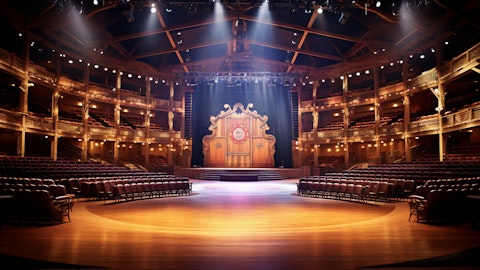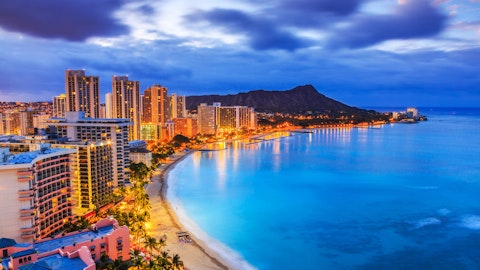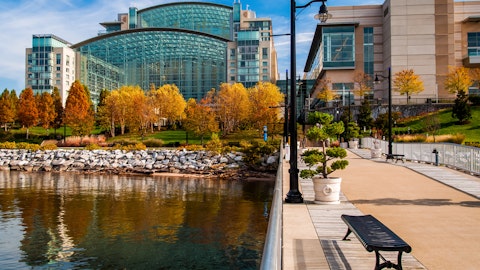And I’d say the second thing is, like we have in other assets, we are driving a tour business that we expect to launch at the end of this year.
Dori Kesten: Okay. And if I can keep you Patrick. Would you expect majority of growth that OEJ over the next few years to more come from your internal growth drivers, what you just talked about and then just the projects that are ongoing or is there a likelihood of external growth there?
Patrick Moore: Austin, specifically, Dori
Dori Kesten: No, just for OEG.
Patrick Moore: Total Yes, for OEG in total, we’re putting three major projects online Vegas, Category 10, which is going to be as Colin outlined, a significant upgrade to that property. And then — and obviously, the improvements both to the W Hotel in Austin and Austin City Limits, I would say the short answer is we’re looking predominantly at the organic growth of the things that we have because we’re putting so much capital into service. That being said, we’re always looking for unit growth of our existing brands and other investment opportunities.
Mark Fioravanti : Yes. And again, Patrick I think in conversations yesterday with our Board, we talked about focusing on those new opportunities that are not embedded into our business today, we should see very good growth next year and the year after, just based on what we’re doing today on the existing assets, but we’re looking at multiple other things here with this business. It’s a very interesting business that we have many different avenues to go down to continue to grow it.
Dori Kesten: Great. Thank you.
Mark Fioravanti : Thanks, Dori.
Operator: Our next question will come from Bill Crow with Raymond James.
Bill Crow : Hey, good morning. Congrats on another year. Mark I was wondering if you could address the National. It’s just – it’s been slower to ramp post-pandemic. And I just – we don’t spend a lot of time talking about that asset on these calls. I’m just wondering from a momentum perspective, how is that asset doing relative to the rest of the portfolio?
Mark Fioravanti : I would say relative to the rest of the portfolio, it has been slower to ramp. But what’s really driving that, Bill, is the market. The D.C. market has not recovered as quickly as the other markets that we’re participating in. And when you compare the National to itself and how it performed pre-pandemic, that hotel has never performed better. Whether you’re looking at how they’re performing with groups, group penetration, food and beverage revenues, food and beverage margins, customer satisfaction scores. That team there has really done a terrific job and the investments that we made both in terms of renovations and food and beverage during the pandemic have paid dividends for us. So we’re always working to drive better results, but we’re pretty happy with where the National is and where it’s going. And it’s — as that market recovers, that hotel is very well positioned to perform.
Colin Reed : The other thing that I’ve noticed with the National, Patrick you may want to talk about this is that just the pace of bookings that we’ve seen over the last 12 months, it’s been very encouraging. We have a very good 2023 in that hotel in terms of bookings for future years and lead volumes have a very attractive at this hotel.
Patrick Moore: Yes, I would agree. I mean everything Mark and Colin we agree with that the hotel — while the market is a bit slower to respond, we’ve seen tremendous growth on all fronts to both Mark and Colin’s point. So one of the things that we told the property a few years ago was that we needed to fix some of the things that had been maybe lagging behind, its sister properties, and the hotel has done an outstanding job of getting everything on par with its sister properties, and that allows us to start talking about growth for that hotel long-term. And I think we’ve reached that point now. And so while we — as we talked about at Investor Day, we’re prioritizing Opry Live, Rockies and then our Texas hotels. We are starting to have conversations around what do we do to stimulate additional growth with investment at Gaylord National because they’ve done such a great job of really getting the ship righted and much more competitive with the sister hotels.
Colin Reed: Patrick through cohort, Bill unlike all of our competitors in that market, Patrick we probably invested – I am thinking almost $100 million. When you think about the rooms refurbishment and food…
Patrick Moore: Food & Beverage
Colin Reed: Food & beverage and repositioning, we put $100 million into that. And as Mark said in his comment to your question, I think, this year, we’re going to accomplish internally a number for this hotel is the best year we’ve ever had. And it’s a consequence of all of those repositionings. And I’ve really — I’ve been personally very encouraged by some of the booking trends that we have seen in this hotel over the last few months.
Bill Crow: That’s great color, exactly what I was looking for. If I could just do a follow-up. I can’t remember if this was addressed at the Investor Day or not. But I know when you went into Austin, there was – originally talked about selling the JW [ph]. It’s now part of the Stratus deal. And does that change the outlook for sale? Or does the closure of the convention center make a sale less likely, at least for the next handful of years?
Mark Fioravanti: I don’t — yes, I don’t think that the convention center renovation and closure would — will influence that decision. We’ve — we were undertaking a full renovation there. And generally, the way that — we think about it from an entertainment business perspective is that it’s a terrific asset. And the real question for us is how we want to operate that Block 21 complex? And what are the relationships and synergies that we can drive and create between the hotel and the venue. It is an asset that we do have the opportunity to monetize if we would choose to in the future. It is not encumbered by management or brand on sale. So there is a — in terms of value creation, there is an opportunity for that hotel to be repositioned if someone wanted to build a luxury product there. So it’s — we have that optionality, Bill. I don’t think we know at this point, what we want to do with that asset.




